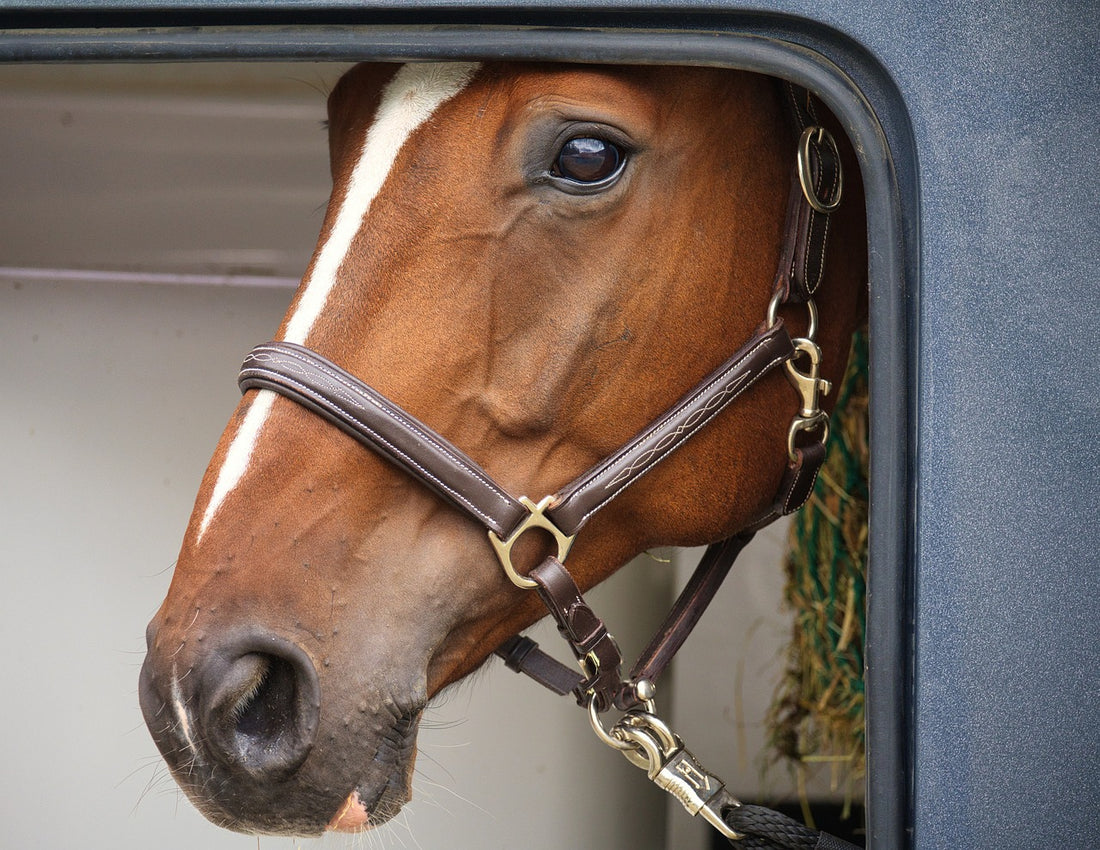Transporting your horse in a trailer can be stressful, especially during hot weather when temperatures inside can quickly rise to uncomfortable levels. In warm seasons, ensuring your horse stays cool and comfortable during transportation is essential for their well-being and safety.
In this guide, we’ll share practical tips and techniques from our friends at Ken Feagin Truck & Trailer to help you keep your horse cool and calm while traveling in a trailer. From proper ventilation and temperature regulation to hydration and stress management, we’ll cover everything you need to know to ensure a smooth and safe journey for your equine companion.
The importance of horse trailer ventilation
A ventilated trailer is crucial when transporting horses because it provides a comfortable and safe environment during travel, especially in the summer or hotter regions. Here are a few essential reasons why a well-ventilated trailer is important for your horses.
Prevents overheating
Horses are susceptible to heat stress, especially during transportation when confined in a trailer. High temperatures, combined with limited airflow and ventilation, can lead to heat exhaustion or even heat stroke in horses. Overheating can have serious health consequences for horses, including dehydration, muscle cramping, and respiratory distress. Prolonged exposure to high temperatures without adequate cooling measures can compromise the horse’s health and well-being.
Protects their respiratory systems
Horses have very sensitive respiratory systems. Good ventilation ensures a constant supply of fresh air, preventing the buildup of stale or polluted air inside the trailer. Ventilation helps prevent moisture accumulation inside the trailer, which can lead to mold growth. This helps reduce the risk of respiratory problems for your horses, especially during long journeys.
Helps reduce stress
Transporting horses can be stressful, and heat exacerbates this stress. Keeping the trailer cool and comfortable can help minimize stress levels and ensure a smoother and more relaxed journey for your horse. Windows and slats reduce the sensation of being confined, and adequate airflow helps them feel more comfortable, contributing to a smoother journey overall.
Can you buy an air-conditioned horse trailer?
Yes, you can absolutely buy air-conditioned horse trailers. These trailers are designed to provide a comfortable and climate-controlled environment for your horses during transportation, particularly in hot or humid weather conditions. The AC units in these trailers are similar to those in RVs and trucks.
While air-conditioned horse trailers offer the benefit of keeping horses cool and comfortable during transportation, they’re usually more expensive than traditional trailers without air conditioning. However, if you live in a hot area and regularly transport your horses, especially over long distances, the investment may be worthwhile to ensure the well-being of your animals.
How to keep your horse cool in a trailer
Have a trip with your horse coming up? Here are some crucial ways to help keep your horse cool and comfortable while transported in a trailer.
1. Find a trailer with plenty of windows
Look for trailers with ample ventilation options, like multiple windows, roof vents, and/or side vents. This helps reduce the risk of respiratory problems and heat stress, especially during hot weather. Additionally, vents and windows regulate airflow, helping maintain a comfortable temperature inside the trailer by promoting air circulation. Windows also provide natural light and visibility for the horses, contributing to their well-being and reducing stress during travel.
2. Invest in trailer fans
Fans are incredibly effective at keeping horses cool while in a trailer. Some trailers come equipped with installed fans, but you can also buy them separately if your trailer doesn’t have them or you think you need more.
Place the fan in a spot that maximizes airflow throughout the trailer, ideally near a window or vent where it can draw in fresh air from outside and circulate it throughout the trailer. Orient the fan to blow air in the direction that benefits your horses most. Some horses don’t like fans blowing directly on them, so experiment with different positions to find the one that best suits your horse.
3. Find a trailer with proper insulation
Insulation is another crucial way to keep horses cool in their trailer. Insulated trailer walls help prevent heat buildup by providing a barrier between the interior and exterior environments. This means that even if the outside temperature is high, the trailer’s interior stays relatively cooler, creating a more comfortable environment for the horses. Some types of insulation also have reflective properties that can help reflect solar radiation away from the trailer, further reducing the amount of heat that builds up inside.
Insulation can help improve the efficiency of the cooling system in trailers equipped with air conditioning by reducing the workload. By maintaining a more stable and moderate temperature inside the trailer, the air conditioning unit doesn’t have to work as hard to keep the interior cool, which can lead to energy savings and prolong the lifespan of your trailer.
4. Park in the shade
Park the trailer in a shaded area whenever possible, especially during stops or breaks. Direct sunlight can significantly increase the temperature inside the trailer, so providing shade helps keep it cooler. Even if your horses aren’t inside the trailer for this time, doing so will keep the temperature comfortable when it’s time for them to load up again.
5. Avoid peak heat times
Whenever possible, schedule travel during cooler parts of the day, like early morning or late evening, to minimize the risk of heat stress on your horses. Avoid traveling during the hottest part of the day, usually mid-afternoon, or during extreme heat waves if possible. Check on your horse regularly and be attentive to signs of heat stress in your horse, like excessive sweating, rapid breathing, lethargy, or reluctance to move.
As a general rule, temperatures above 90°F (32°C) can start to pose risks to your horses during transportation. Horses that are older or not as healthy might be more sensitive to lower temperatures. We recommend consulting your vet before transporting your horse if you have concerns.
6. Keep your horse hydrated
Place water buckets securely in the trailer to give your horse water access during the journey. Ensure the buckets are stable and cannot tip over while the trailer is in motion. Some trailers are designed with built-in holders or water tank systems to accommodate water buckets.
Consider adding electrolytes to your horse’s water or feed before and during transportation, especially during hot weather or strenuous activities. Electrolytes help replenish lost minerals and encourage your horse to drink more water.
Learn more: Horse Hydration 101: How Much Water Should Your Horse Drink in a Day
7. Schedule regular breaks
When traveling long distances with your horse, schedule a few rest stops and breaks. Ideally, give your horse a break every four to six hours to rehydrate, relieve themselves, stretch, and cool off if necessary. If you plan to travel longer than twelve hours, consider stabling your horse to prevent exhaustion.
Keeping your horse cool and hydrated during transportation in a trailer is crucial for their well-being and safety. By ensuring proper ventilation, providing access to water, and scheduling breaks during the journey, you can help minimize the risk of heat stress and dehydration for your equine companion. Remember to monitor your horse’s condition closely and adjust as needed to ensure a comfortable and stress-free travel experience.
The right trailer plays a big part in keeping your horse cool and comfortable during transport! Ken Feagin and his team have a wide selection of horse trailers for all purposes. Give them a call or stop by to see their horse trailer selection in Campobello, SC!
You might also like:

